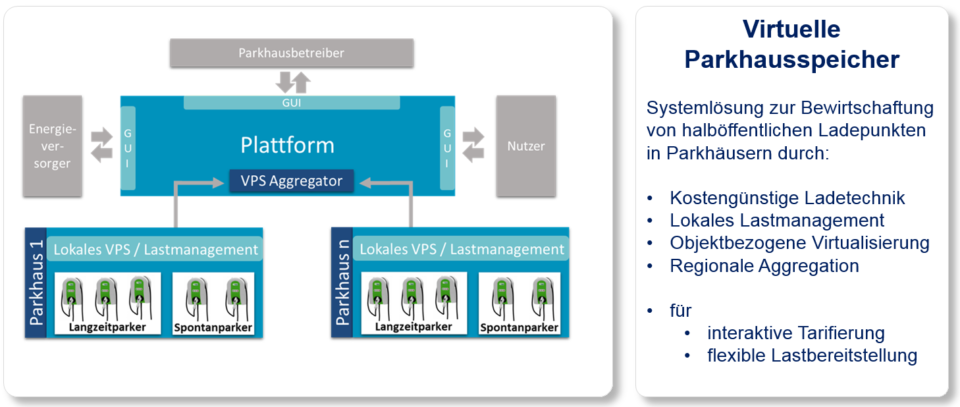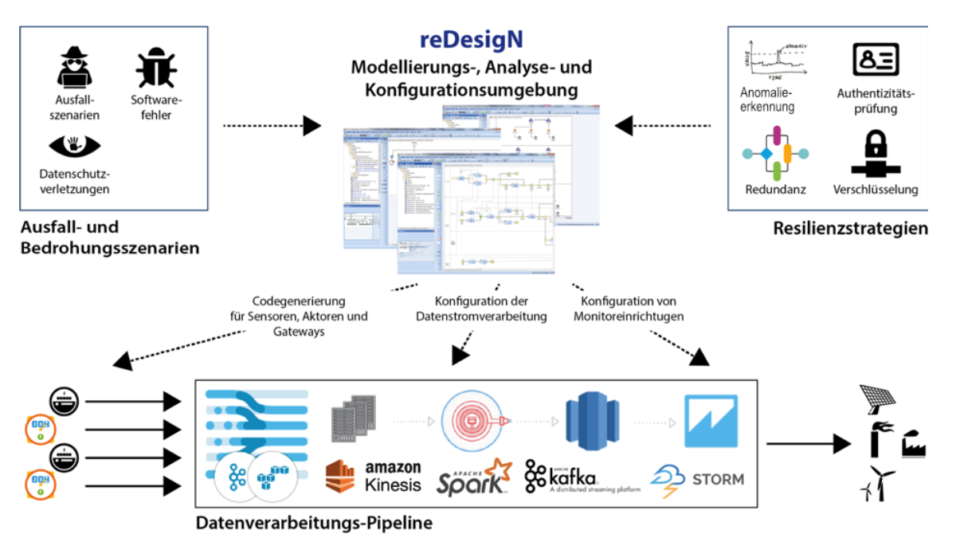Working on the Future
We create the future: In a various development projects, EFR and partners are developing solutions for tomorrow and beyond.
EFR is working on development projects financed by the European Fund for Regional Development.

The following funded projects are currently active:
Redispatch 3.0
Redispatch demonstration project and marketing of unused flexible capacities of microfacilities
VPFS
Virtual parking facility storage system
reDesigN
Resilience by Design for IoT data platforms, using distributed energy management as an example
Resilient meters
Electricity meters for measuring active power with residential and commercial customers
Redispatch 3.0
Redispatch demonstration project and marketing of unused flexible capacities of microfacilities
The progressive decentralization of electricity supply and the increase in volatile power generation facilities require well-considered procedures by all parties concerned to avoid electricity congestion. Amendment of the Grid Expansion Acceleration Act (NABEG 2.0) is a consequence of this. The goal is to use Redispatch measures to achieve efficient, economical and reliable use of the electricity grid at all levels.

Project goal
The aim of the project is to demonstrate and research unused flexible capacities of small power systems behind smart metering systems. The goal is to further develop existing concepts from the Redispatch 2.0 project and to implement, test and evaluate the resulting approaches in pilot projects. An additional goal is to improve integration of low-voltage facilities and cooperation and information exchange between transmission grid operators and distribution grid operators.
Project period:
1/1/2022 – 12/31/2024
Consortium:
- PSI
- University of Kassel
- energy & meteo systems
- EFR
- Kisters
- DKE
- EWEnetz
- TU Dortmund University
- MVV Netze
- Fraunhofer FIT, Fraunhofer IEE
- EWR Netze
- Associated partner: Tennet
EFR’s role in the project
Implementation of control (switching and schedule-based use planning) of microfacilities through the CLS interface of an iMSys and investigation of implementation alternatives. The facilities can be considered individually or meaningfully aggregated.
VPFS – Virtual Parking Facility Storage System
The share of electromobility in the overall transportation market is increasing exponentially, and the public power grid must be able to handle the associated additional demand. This requires investment, as well as the deployment of smart control.
Charging stations in public parking areas play a vital role in achieving higher acceptance of electric vehicles.
The challenges are in the provision of charging capacity, taking into account the existing capacity of the current grid situation and the individual needs of electric vehicles. In addition, a system is required that enables innovative energy industry services and attractive prices for users.
The Virtual Parking Facility Storage (VPFS) research project comprises an innovative concept for pooling charging devices in the parking facility environment and provision of flexibility in the energy market.

The goal of the project is a system solution for the operation of semi-public charging points in parking facilities by means of low-cost charging equipment, local load management, object-related virtualization and regional aggregation. In addition, interactive tariff setting and flexible load provision will be implemented.
Along with EFR, the consortium includes the following companies and institutions:
- JustOn
- Fraunhofer Institute for Optronics
- Systemtechnik und Bildauswertung IOSB
- TU Ilmenau
- Erfurt Weimar Airport

Within the project, EFR is working on the development of a specific charging technology compliant with the German Standard Weights and Measures Act that fulfills the functional and technical performance requirements of this deployment scenario.
Development results from this project:
- New charging box for universal deployment
- Universal interface for secure data exchange
- Local charging load management
- Charging box design compliant with the German Standard Weights and Measures Act
This is based on many years of experience with electromobility and grid-friendly control of the charging process.
reDesigN
Resilience by Design for IoT data platforms, using distributed energy management as an example
The object of the reDesigN funded project is better support for the design and construction of secure, robust, data-flow-centric IoT applications (using distributed energy management as an example) by means of software and system engineering methods. In particular, attention is given to how application-specific requirements for resilience can be taken into account.
The goal is the development of specific solutions to ensure fault tolerance, robustness and security in data stream processing and a distributed energy management system built on this. A parallel goal is the development of a new method for the modeling and evaluation of resilience (including a fault model and testing) depending on the application context and evaluation of a system design for resilient energy management based on IoT data streams.

TU Ilmenau, Databases and Information Systems
TU Ilmenau, Software Engineering for Vital Systems
Fraunhofer IOSB-AST
CUCULUS
EFR is working on resilient field equipment in the framework of research projects. These projects investigate resilience requirements and potential fault and failure scenarios, with particular attention to the analysis of field devices for energy management. The focus is on field devices of smart metering systems and charging infrastructure.
Resilience solutions will be evaluated and test scenarios developed, combined into a set of methods for design-time and run-time adaptation of resilience strategies in concrete software architectures.
This will be followed by a generalization of the methodology as well as design support by means of tool development. This will result in the creation of fail-safe field devices for IoT services for energy management applications.
Resilient meters
The object of this project is electricity meters for measuring active power in residential and commercial environments. The electromechanical electricity meters used up to now (Ferraris meters) register the active current and AC voltage and perform an inherent multiplication based on the operating principle of an induction motor with time integration of both physical measurement values to register the consumption of electrical energy.
The calibration validity of Ferraris meters is basically 16 years; for electronic meters it is 8 years. The disadvantage of electronic meters compared to electromechanical meters is the aging of the electronic components. Furthermore, there is a lack of long-term experience with electronic household meters.
The goal of the Resilient Meters research project is the development of an innovative electronic electricity meter that achieves unlimited calibration validity by means of internal measured value monitoring.
Such an electricity meter could reduce system costs and make a major contribution to reducing electronic waste.
The consortium consists of EFR and JuB – Creative Product.
The EFR subproject consists of modeling and meter development. This includes:
- Simulation of the resilience strategy
- Development of measurement circuit suitable for simulation
- Analysis of the dependencies and validities of the method
- Development of the test process and test procedure
- Lab prototype
- Validation under laboratory conditions
